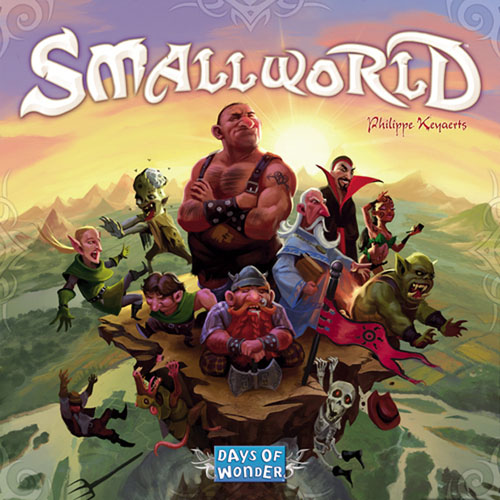Doug's Dungeon - Small World
Now listen, I’m just not a fan of ‘Risk’.
“Wait what?” you ask Doug in a war room full of grizzled warriors, all of different species.
It’s just that... the game is more a commentary on the harsh penalty and crushing emotions of war we all face… rather than an entertainment box like other board games.
“No I mean-” you reply “What’s with the cold open? Usually I have to wade through some poorly constructed scenario which has loose ties to a board game. One you’ll THEN yab on about for say, three pages of dialogue? This is honestly very jarring, especially because I, the stand-in for the audience, never speak. Are you okay Doug?”
I appreciate the concern, purposefully unnamed character. You see, I like to talk about board games because I feel saddened that there is an entire world of entertainment that many people will simply pass by. For many, I start a conversation about board games with them, and most talk about their dread memories of Monopoly and Risk. Others consider them a way to occupy children, buying up copies of ‘Connect 4’ and ‘Guess Who’. There is nothing inherently wrong with these titles, in fact I applaud their way to get people to engage with each other in person. To socialize. The problem is… they just aren’t what I would call board games anymore.
Indeed, board games have come a long way in the past decade (or more), and each new entry pushes one of the ‘old guard’ off into obsolescence. Risk, for example, has served its function by popularizing the idea of controlling areas and fighting with large armies. But it was clunky. The outcome of the game was decided very early, and besides the statistically unlikely upset here and there, the game just sort of... winds down to the end rather than crescendos. All of your men were simply a number, a figure. Your 12 faceless dudes versus my 13. And the entire fight is decided by a series of dice rolls. The more men piling into the fight, the more times the dice had to be rolled. Sure, one could employ strategies to ‘hedge their bets’ but the game is vastly about chance. For a game that has players waging war across the entire globe, it somehow manages to make it feel like a very small world.
Speaking of Small World-
“Ahhhhh, you got me!” You say “And hey, it still took the same amount of time for us to get to the point! Please continue”
Small World carries on the legacy of area control games with an absolutely explosive amount of character. The artwork catches me immediately and tells me ‘let’s have a fun time’. In this game, armies of various fantasy races are used to control zones on the map. The longer you hold those zones, the more money you accrue. And after a set number of rounds, the game is won by whomever has the most moola. As the title suggests, the map boards in the game are not large enough to support the growing empires of all players for long. Soon enough, boundaries will be drawn and then crossed. Rivalries will be born. Wars will be fought. And in the end, only the most tactical player will come out on top.
To play a game of Small World, players will pick a race-class combination from a randomly generated list of tiles. The races you choose from all have special abilities, and gain more from the class they have been paired with for the game. Races such as the skeletons can generate more soldiers for their army when they slay enough enemies on their turn. Meanwhile the elves do not lose forces when forced to retreat. Classes include ‘Pillaging’, which earns that army more gold for each occupied region they conquer per turn. ‘Swamp’ armies earn more gold from each swamp region they control. Each game feels different as more class-race combinations develop. Flying skeletons, for example, are particularly terrifying. Being able to invade any region on the map allows them to avoid front lines and pick off poorly defended areas. This in turn feeds their ability to multiply upon killing foes. And you know, they are literally piles of flying bones.
Once a player chooses one of these combos, they get a set of tokens equal to the sum of the numbers shown on the class and race tiles they picked. And the thing is, that’s all the guys you’re getting. Save for a few exceptions, you need to work with the forces you are given. And herein lies the trick: How do you best use your tokens? Can you afford to spread yourself thin, leaving only one or two tokens per region for a large payoff? Or do you play defensively, piling your tokens high in a select few regions to deter fights? As a Small World player, these are the questions you need to answer. Players start invading from any edge of the board, needing two tokens to take an empty region, and adding one more for any token or obstacle in the way like mountains. Soon enough, the board will fill with tokens, and after enough combat with other players (resolved the same way as invading), armies will begin to wear thin.
So what then? Like any classic skirmish game I start with a full force and start whittling it away? Not in Small World. At the start of any of your turns, you may choose to put your current race ‘into decline’. When you do, you turn your tile and tokens on the board face down. They will not be able to invade any further, and your turn ends, collecting money for your regions as normal. But on your next turn, you can pick a new race-class combo from the stack! A fresh injection of soldiers that once more must invade from the border. You can have up to one in decline race at any time, so if you get tired of the second one you’ll have to discard the first. The decline rule adds further depth to the game. Players will need to time their switches correctly, making sure not to stretch too far on a given race. You also don’t want to switch too quickly, losing value on an army you could have pushed further.
The culmination of all these rules and variances is what gives this game life. Small World is a game that wants to be played, and played again. Not to mention, it’s a game that’s incredibly easy to expand upon. And so they did. Days of Wonder has churned out a sizable franchise from this title, making an ‘underground’ variant which features more ‘menacing’ races. Like spider people and mummies. Players who have both (like myself the lucky git) can make full use of the ‘Realms’ expansion, that does away with the standard boards in exchange for large region tiles. With each tile being rotatable, flippable, and interlockable, the map possibilities are endless. Even so, the wacky scenarios and edited rules the box ships with are a lot of fun. Hell, just as I write this I’ve gone and found out they’ve made a ‘River World’ expansion to the core game… just LAST YEAR! Talk about a game with support. And *checks boardgamegeek.com entry* oh my lordy it’s a pirates expansion. Aww yissss. Small World and it’s expansions already took up half a display cube in my collection, but I predict it will have its own little library pretty soon. There are even a handful of mini-expansions with a couple extra races and classes, just to keep you exploring.
Small World goes to show the kind of icebergs that lie beneath the surface of the board game ocean, showing only their tip in the form of games like Risk. My review of Pandemic even (ahh memories) failed to encapsulate not only the many expansions of, but also variants on the game. They’re making a C’thulu version of it this year. A C’thulu version. And don’t even get me started on THAT rabbithole. Speaking of, hey Days of Wonder where’s my C’thulu Small World expansion?
Don't own Small World yet? No problem, you can find it on our webstore here.

Doug Moore

I'm an avid lover of all things table top. I also have a growing collection of board games which inspire me to create my own. I put my loud and expressive personality to good use as a dungeon master for my friends, having run many campaigns through 4th and 5th edition D&D.
Follow him on Twitter
@Dugggernaut
















